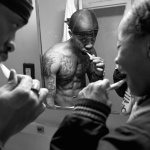When you hear the phrase “lynch mob,” what image comes to mind? Most of us will probably think of tooth-free rednecks with pitchforks off to find themselves some darker-skinned folks to harass. Or we might cast our minds back to a time when angry, hungry people regularly rounded up eccentric old women, blamed them for causing crop failures and other local calamities, and then had them dunked or burned as witches.
I saw a different kind of lynch mob recently at Columbia University. There wasn’t a pitchfork in sight. No one started a fire. Yet this gathering of self-styled justice enforcers, who were loudly demanding the metaphorical scalp of an individual they suspected of doing something bad, nonetheless had the same scary moral righteousness and disregard for due process as every other lynch mob in history. It’s just that they were better dressed, better educated, far more middle-class than the usual fire-wielding dispensers of mob justice. It was an Ivy League lynch mob.
The gathering took place last week as part of a global student uprising against “rape culture” on campus. In solidarity with Columbia student Emma Sulkowicz, who has been dragging around her mattress for the past two months in protest against Columbia’s failure to expel the male student she claims raped her in 2012, students at Columbia and 130 other universities around the world brought their mattresses out, too, many of them emblazoned with slogans condemning “rape culture.”
A self-styled Christ of modern student feminism, only forlornly hauling around her bedding rather than a crucifix, Sulkowicz has become a cause célèbre in progressive circles. She’s featured in borderline fashion shoots for New York magazine, complete with skinny jeans, gorgeous flats, and, of course, cross-like mattress slumped across her back like the weight of the world. She and her backers have been gushingly congratulated by vast swaths of the media for “starting a revolution against campus sexual assault.”
There’s only one problem with this depiction of the mattress protest to get a male student thrown out of Columbia as some great liberal, revolutionary strike — the male student in question has not been found guilty of assaulting Sulkowicz. Her alleged assailant (many in the media forget to use the word “alleged”) was brought before a disciplinary hearing at Columbia and found “not responsible” for the things Sulkowicz accused him of. Sulkowicz later filed a complaint with the police but, according to the New York Times, “didn’t follow through with the necessary steps to prosecute the student.” So, she and her cheerleaders want a student who has not been convicted of assault to be expelled from the university. They want a man to be punished on the word of one accuser, which is surely behavior more befitting a Stalinist tyranny than a liberal-arts college.
At Columbia, I was startled by some of the mob-like invective falling from the mouths of otherwise bright, well-read students. One group of female students said “the rapist” must be expelled. But he hasn’t been found guilty of committing rape, I said. “We know he committed the rape,” one said, with the kind of steely-eyed conviction that recalled (admittedly in a much less lethal context) how KKK members once “knew” that their black victims were guilty of raping local white women.
A male student told me my insistence that individuals suspected of a crime must be fairly tried and found convincingly guilty before we ruin their lives — and being expelled from a prestigious university for rape would undoubtedly be life-ruining — was evidence that I had fallen for the “liberal paradigm” of justice, which tends to benefit white, well-off men. Apparently there is another “paradigm,” a better one, in which women who accuse men of rape are instantly believed and the men in question swiftly and severely punished.





